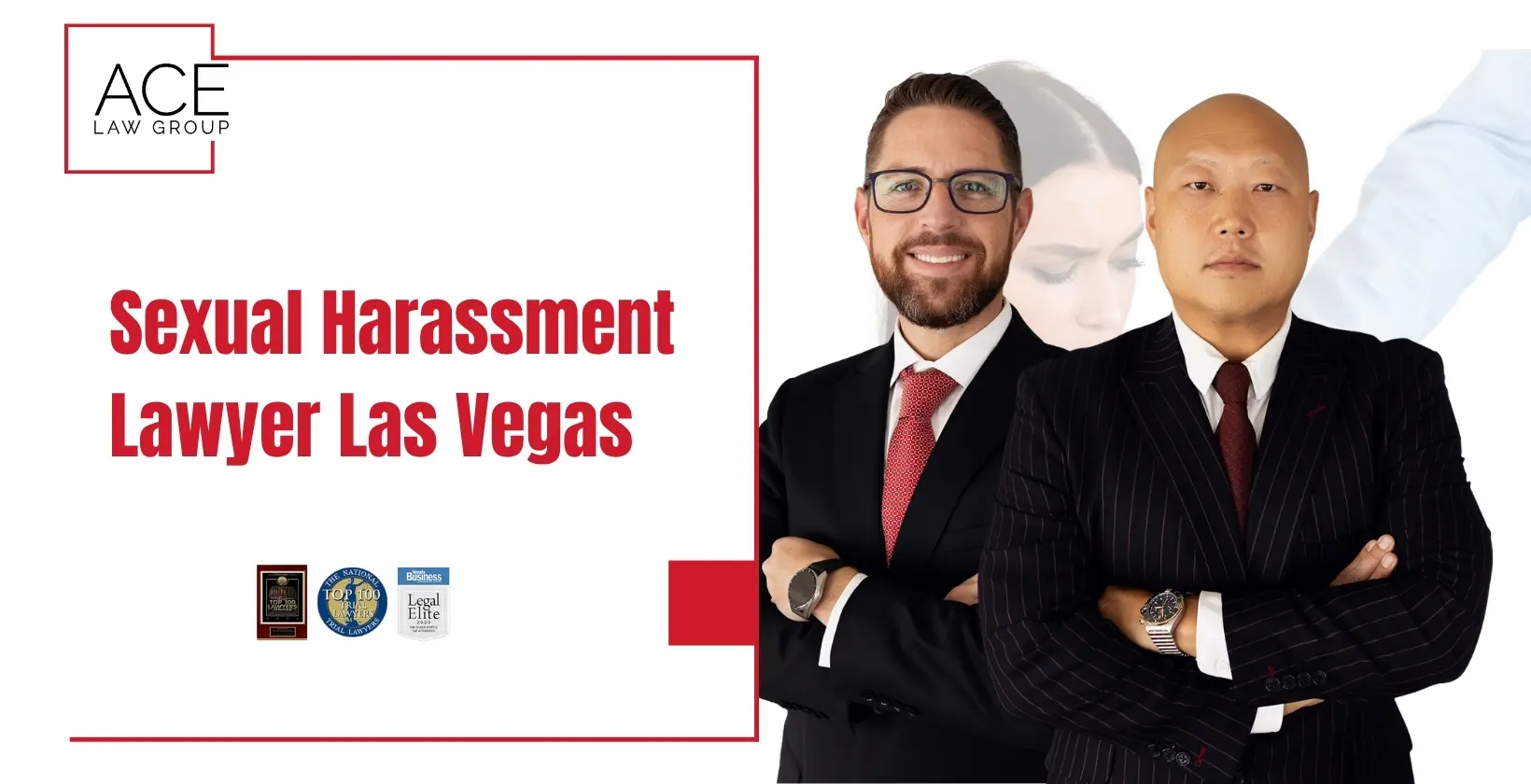Many people subject to mistreatment at work do not have the words to describe what is happening, and that is completely understandable. Sexual discrimination and sexual harassment are two different legal issues. Understanding the difference can help you protect your rights and take meaningful action.
At Ace Law Group, we support workers across Las Vegas who are unsure about what they are experiencing but know something feels wrong.
Ace Law Group is committed to helping you understand what is happening and take action. You do not need to have legal knowledge to start speaking up. We will listen, explain your rights, and help you determine the best course of action.
Facing Sexual Harassment or Discrimination in Nevada? Call NowKey Differences: Sexual Discrimination vs Sexual Harassment
Here is a quick comparison to help you see how these two legal issues differ under the law.
| Aspect | Sexual Discrimination | Sexual Harassment |
|---|---|---|
| Definition | Unfair treatment based on sex, gender, pregnancy, or gender identity. | Unwelcome behavior of a sexual nature that creates a hostile or offensive work environment. |
| Legal Basis | Title VII of the Civil Rights Act + Nevada law. | Title VII + EEOC guidelines + Nevada anti-harassment statutes. |
| Examples | Denied promotion due to pregnancy, unequal pay, and hiring bias. | Repeated sexual jokes, unwanted touching, inappropriate messages. |
| Responsible Party | Employers, supervisors, HR decision-makers. | Supervisors, coworkers, vendors, and employers, if they fail to act. |
| Proof Needed | Show that a decision (hiring, firing, promotion) was influenced by sex-based bias. | Show that the behavior was unwelcome, severe, or repeated, and impacted your ability to work. |
| Filing Process | File with EEOC or NERC (Nevada Equal Rights Commission). | File with EEOC or NERC; may include employer’s internal investigation. |
What is Sexual Discrimination?
Sexual discrimination happens when a worker is treated unfairly because of their sex, gender identity, or pregnancy. This includes biased decisions in hiring, promotions, pay, or workplace treatment based on gender-related factors. U.S. and Nevada laws both prohibit this kind of conduct and provide protections to workers.

How U.S. Employment Law Defines Sexual Discrimination
Under Title VII of the Civil Rights Act, sexual discrimination happens when decisions related to hiring, pay, promotion, or firing are based on someone’s sex, gender identity, or pregnancy. The EEOC enforces these protections if the bias involves a legally protected category.
Gender, Pregnancy, and Sex-Based Discrimination
Sexual discrimination can affect women, men, pregnant workers, and non-binary employees. It includes unequal treatment, exclusion, or punishment based on gender roles or appearance.
Examples include:
- Being demoted for pregnancy.
- Getting mocked for gender expression.
- Denied leave because of gender bias.
Stereotypes are the basis for this harmful behavior. These actions are illegal under both Title VII and the Pregnancy Discrimination Act.
Who Can Be Held Liable for Sexual Discrimination?
Employers are legally responsible for preventing workplace discrimination. This includes supervisors, HR teams, and anyone involved in hiring or firing decisions.
Liability applies when:
- A manager discriminates against an employee directly.
- HR ignores complaints.
- Retaliation follows a report.
Even third-party contractors may be liable if acting on behalf of the business.
Your Employer Has a Legal Duty—We’ll Help Hold Them AccountableWhat Laws Protect You from Sexual Discrimination?
Title VII of the Civil Rights Act is the main federal law protecting you from sexual discrimination. It bans bias based on sex, gender, and pregnancy.
You are also protected by:
- The Equal Pay Act
- The Pregnancy Discrimination Act
- Nevada Revised Statutes (NRS 613.310–613.435)
Complaints are filed with the EEOC or the Nevada Equal Rights Commission (NERC). Time limits apply, so complainants must act quickly.
What Is Sexual Harassment in the Workplace?
Sexual harassment in the workplace means any unwelcome conduct based on sex or gender that disrupts your ability to work or makes the environment feel unsafe. Next we will delve deeper into how the EEOC defines this conduct, the types of harassment, common examples, who may be liable, and what legal protections exist, particularly for workers in Nevada.

How Does the EEOC Define Sexual Harassment and Set Legal Standards?
The EEOC defines sexual harassment as unwelcome conduct based on sex that affects work conditions or creates a hostile environment. It includes comments, touching, gestures, or digital messages. Harassment does not need to involve physical contact; verbal and non-contact interactions that are sexual in nature, make the recipient feel uncomfortable, and are disruptive to work productivity are enough to qualify.
Nevada Law Backs You—Let Us Enforce ItTypes of Sexual Harassment: Hostile Work Environment and Quid Pro Quo
Hostile work environment occurs when repeated sexual jokes, gestures, or comments make the workplace uncomfortable or threatening.
Quid pro quo harassment happens when job benefits like raises or promotions are offered in exchange for sexual favors or withheld after rejection.
Common Harassment Behaviors and Signs
Workplace harassment may be verbal, like dirty jokes or comments about your body. It may be physical, such as unwanted touching. Or, visually, such as offensive memes or texts. It often starts subtly, then grows in frequency and intensity. If any ongoing action from a boss or co-worker makes you feel uncomfortable, it may qualify as harassment.
Who Can Be Held Accountable for Workplace Harassment?
Liability can fall on coworkers, supervisors, clients, or vendors. Employers are responsible if they knew about harassment and failed to act. Even HR’s inaction can result in legal consequences for the company.
Legal Protections for Nevada Workers Against Harassment
Nevada protects workers under state laws enforced by the Nevada Equal Rights Commission (NERC). These laws apply if your employer has just two or more workers. Federal laws, such as Title VII, apply to companies with 15 or more employees. Both prohibit retaliation and support your right to report safely.
Can You Experience Both Discrimination and Harassment at Work?
Yes, you can experience both sexual discrimination and sexual harassment in the same workplace. These claims often overlap when unfair treatment and unwelcome conduct are based on your sex or gender.
Real-Life Scenarios Where Discrimination and Harassment Overlap
You reject a supervisor’s inappropriate advances. Soon after, you are removed from key projects or denied a promotion despite positive performance reviews. Or coworkers repeatedly mock your gender identity, and you are suddenly transferred to a less desirable role. These are more than isolated moments; they are signs of both harassment and discrimination.

Legal Strategy When Both Apply
When harassment and discrimination are present, lawyers typically file both claims together. Evidence like emails, reviews, or witness testimony can support both allegations. Dual claims strengthen your case by showing a pattern of bias and unlawful behavior rooted in sex or gender.
Why Documentation is Critical in Dual Claims
Clear documentation is essential because courts will not rule in your favor on the basis of hearsay or your story alone—there must be hard evidence. Keep emails, texts, chat messages, written complaints, and performance records. Witness statements, internal reports, or changes in duties or salary can also be helpful. A timeline connecting incidents strengthens both harassment and discrimination claims.
Unsure What to Document? Call Us for GuidanceWhat Should You Do If You Are Facing Sexual Discrimination or Harassment?
If you are dealing with sexual discrimination or harassment at work, do not ignore it. Taking prompt action protects your rights and strengthens your case. Below are steps to safeguard yourself and begin the legal process.
Steps to Take Immediately (Document, Report, Protect)
- Document the incidents. Write down each event with dates, names, and details about what happened.
- Save all evidence. Keep emails, texts, photos, and any messages related to the conduct.
- Report the issue internally. Submit a written complaint to HR or your supervisor as outlined in your company policy.
- Track communication. Request a written confirmation and save any HR responses.
- Talk to an employment lawyer. Legal guidance early on can prevent costly mistakes and protect your rights.
Your Legal Rights Against Retaliation
Federal and Nevada law prohibit employers from retaliating against workers who report harassment or discrimination. Retaliation includes termination, demotion, or unfair treatment after a complaint. If these actions happen after you report misconduct, you may have a separate retaliation claim under state or federal law.
When to Contact an Employment Lawyer
Contact a lawyer right away if your complaint is ignored, if you are punished after reporting, or if your job is threatened. Legal support is crucial when facing retaliation or preparing to file a formal complaint. A sexual harassment lawyer will help protect your rights and guide you through your next steps.
No Fees Unless We Win—Speak With a Lawyer TodayWhy These Issues Persist in Modern Workplaces
Sexual discrimination and harassment still happen in the modern workplace, not because there are no laws, but because many workplaces still ignore warning signs, fail to take complaints seriously, or protect the wrong people. The following sections examine why many workers remain silent and how unchecked abuse of power and bias persist in offices around the world.
Cultural Barriers: Why Victims Stay Silent
Many workers stay silent because they fear being labeled, retaliated against, or ignored. Some worry about losing their jobs or becoming isolated from coworkers.
Studies show that over 70% of workers who experience workplace harassment never report it. That silence certainly does not mean consent. Rather, it reflects how unsafe many feel speaking up, especially when employers have failed others before them.
How Abusers Use Position to Intimidate
Supervisors or senior employees may use their elevated role to pressure victims. This includes threats about job security or future opportunities if the victim speaks out against the perpetrator.
Even without words, power dynamics can silence lower-level employees. When your boss is the harasser, it can feel impossible to challenge them without risking everything.
How Employers Fail to Enforce Their Own Policies
Many companies have written anti-harassment policies, but actual enforcement in real-life circumstances is rare. Some ignore complaints, protect top performers, or minimize what happened.
Lack of accountability exacerbates the problem. If HR dismisses complaints or delays action, the employer may be legally responsible for fostering that environment.
Gender Stereotypes and Systemic Discrimination
Bias plays out through outdated assumptions, e.g. that men can not be victims or that women are prone to overreacting. These gender stereotypes influence who gets believed and who gets blamed.
Systemic issues show up in pay gaps, lack of promotion, and unequal treatment. These are not just cultural issues; they are legal red flags tied to sex-based discrimination.
What are Common Misconceptions About Discrimination and Harassment?
| Aspect | Sexual Discrimination | Sexual Harassment |
|---|---|---|
| Definition | Unfair treatment based on sex, gender, pregnancy, or gender identity. | Unwelcome behavior of a sexual nature that creates a hostile or offensive work environment. |
| Legal Basis | Title VII of the Civil Rights Act + Nevada law. | Title VII + EEOC guidelines + Nevada anti-harassment statutes. |
| Examples | Denied promotion due to pregnancy, unequal pay, and hiring bias. | Repeated sexual jokes, unwanted touching, inappropriate messages. |
| Responsible Party | Employers, supervisors, HR decision-makers. | Supervisors, coworkers, vendors, and employers, if they fail to act. |
| Proof Needed | Show that a decision (hiring, firing, promotion) was influenced by sex-based bias. | Show that the behavior was unwelcome, severe, or repeated, and impacted your ability to work. |
| Filing Process | File with EEOC or NERC (Nevada Equal Rights Commission). | File with EEOC or NERC; may include employer’s internal investigation. |
FAQs About Sexual Discrimination and Harassment
Discrimination is unfair treatment based on sex, gender, or pregnancy. Harassment involves unwelcome conduct that creates a hostile work environment.
Yes. Off-duty workplace harassment still qualifies if it happens during work-related events or affects your job environment.
You have 180 days with the EEOC and 300 days with NERC to file a sexual discrimination or harassment claim in Nevada.
Yes. EEOC complaints are not anonymous. Your employer will be notified during the investigation.
Yes. Victims can seek damages for emotional distress as part of a legal claim for discrimination or harassment.
No. Sexual harassment does not require touching. Sex-based comments, stereotypes, pregnancy bias, or hostile behavior targeting gender identity can all qualify if the conduct is unwelcome and tied to sex or gender.
Consult with a Las Vegas Sexual Harassment Attorney Today
No one should have to face sexual harassment or discrimination alone. If something at work does not feel right, your concerns are valid, and your rights matter. You deserve answers, respect, and support from an experienced and compassionate Las Vegas discrimination lawyer that listens and takes your experience seriously.

We invite you to schedule a free, private consultation with our legal team at Ace Law Group. We will listen closely, explain your options in clear terms, and help you take the next step toward protecting your rights. Whether you are ready to act now or just need to talk, we are here for you.
Free, Confidential Consultation With a Nevada Workplace Attorney